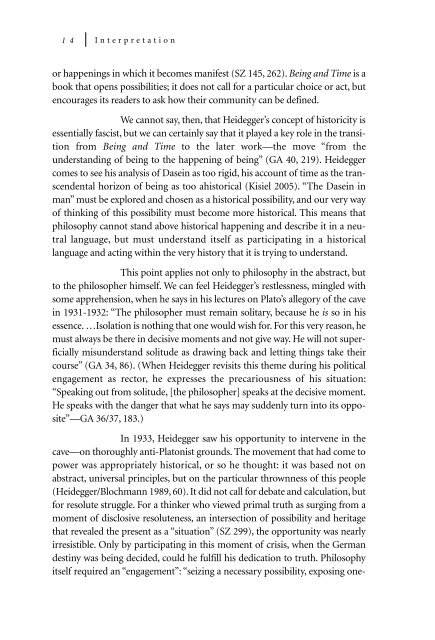Beyond Struggle and Power: Heidegger's Secret ... - Interpretation
Beyond Struggle and Power: Heidegger's Secret ... - Interpretation
Beyond Struggle and Power: Heidegger's Secret ... - Interpretation
Create successful ePaper yourself
Turn your PDF publications into a flip-book with our unique Google optimized e-Paper software.
1 4 <strong>Interpretation</strong><br />
or happenings in which it becomes manifest (SZ 145, 262). Being <strong>and</strong> Time is a<br />
book that opens possibilities; it does not call for a particular choice or act, but<br />
encourages its readers to ask how their community can be defined.<br />
We cannot say, then, that Heidegger’s concept of historicity is<br />
essentially fascist, but we can certainly say that it played a key role in the transition<br />
from Being <strong>and</strong> Time to the later work—the move “from the<br />
underst<strong>and</strong>ing of being to the happening of being” (GA 40, 219). Heidegger<br />
comes to see his analysis of Dasein as too rigid, his account of time as the transcendental<br />
horizon of being as too ahistorical (Kisiel 2005). “The Dasein in<br />
man” must be explored <strong>and</strong> chosen as a historical possibility, <strong>and</strong> our very way<br />
of thinking of this possibility must become more historical. This means that<br />
philosophy cannot st<strong>and</strong> above historical happening <strong>and</strong> describe it in a neutral<br />
language, but must underst<strong>and</strong> itself as participating in a historical<br />
language <strong>and</strong> acting within the very history that it is trying to underst<strong>and</strong>.<br />
This point applies not only to philosophy in the abstract, but<br />
to the philosopher himself. We can feel Heidegger’s restlessness, mingled with<br />
some apprehension, when he says in his lectures on Plato’s allegory of the cave<br />
in 1931-1932: “The philosopher must remain solitary, because he is so in his<br />
essence. …Isolation is nothing that one would wish for. For this very reason, he<br />
must always be there in decisive moments <strong>and</strong> not give way. He will not superficially<br />
misunderst<strong>and</strong> solitude as drawing back <strong>and</strong> letting things take their<br />
course” (GA 34, 86). (When Heidegger revisits this theme during his political<br />
engagement as rector, he expresses the precariousness of his situation:<br />
“Speaking out from solitude, [the philosopher] speaks at the decisive moment.<br />
He speaks with the danger that what he says may suddenly turn into its opposite”—GA<br />
36/37, 183.)<br />
In 1933, Heidegger saw his opportunity to intervene in the<br />
cave—on thoroughly anti-Platonist grounds. The movement that had come to<br />
power was appropriately historical, or so he thought: it was based not on<br />
abstract, universal principles, but on the particular thrownness of this people<br />
(Heidegger/Blochmann 1989, 60). It did not call for debate <strong>and</strong> calculation, but<br />
for resolute struggle. For a thinker who viewed primal truth as surging from a<br />
moment of disclosive resoluteness, an intersection of possibility <strong>and</strong> heritage<br />
that revealed the present as a “situation” (SZ 299), the opportunity was nearly<br />
irresistible. Only by participating in this moment of crisis, when the German<br />
destiny was being decided, could he fulfill his dedication to truth. Philosophy<br />
itself required an “engagement”: “seizing a necessary possibility, exposing one-
















